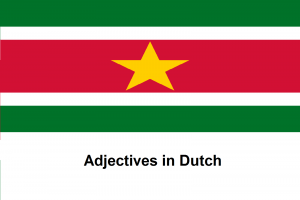Difference between revisions of "Language/Dutch/Grammar/Adjectives"
m (Quick edit) |
m (Quick edit) |
||
| Line 1: | Line 1: | ||
[[File:Adjectives in Dutch .png|alt=Adjectives in Dutch|thumb|Adjectives in Dutch]] | [[File:Adjectives in Dutch .png|alt=Adjectives in Dutch|thumb|Adjectives in Dutch]] | ||
Hello everybody, | Hello everybody, | ||
| Line 10: | Line 8: | ||
Feel free to edit this page by adding new words and expressions ! | Feel free to edit this page by adding new words and expressions ! | ||
Happy learning! :) | |||
'''Adjectives''' in Dutch (''Dutch:'' Bijvoeglijke naamwoorden/Adjectieven) can be placed before the noun or after the noun, just like in English. When the adjective is placed after the noun (mostly using a verb like ''zijn (to be)),'' or when the adjective relates to another adjective, it is called an '''adverb''' (''Dutch: Bijwoord)''. | '''Adjectives''' in Dutch (''Dutch:'' Bijvoeglijke naamwoorden/Adjectieven) can be placed before the noun or after the noun, just like in English. When the adjective is placed after the noun (mostly using a verb like ''zijn (to be)),'' or when the adjective relates to another adjective, it is called an '''adverb''' (''Dutch: Bijwoord)''. | ||
The following examples are all adjectives and <u>no</u> adverbs! | The following examples are all adjectives and <u>no</u> adverbs! | ||
Upon gaining a strong command of this content, you might want to explore these related areas: [[Language/Dutch/Grammar/Future-Tense|Future Tense]], [[Language/Dutch/Grammar/Conditional-Mood-in-Dutch|Conditional Mood in Dutch]], [[Language/Dutch/Grammar/How-to-Use-Have|How to Use Have]] & [[Language/Dutch/Grammar/Prepositions|Prepositions]]. | |||
{| style="border:4px #ff0000; border-bottom: 4px #4b0082; border-top: 4px #4b0082; border-style: solid; border-width: 20px; padding: 5px;" | {| style="border:4px #ff0000; border-bottom: 4px #4b0082; border-top: 4px #4b0082; border-style: solid; border-width: 20px; padding: 5px;" | ||
| | | | ||
| Line 36: | Line 35: | ||
|} | |} | ||
== | ==Other Lessons== | ||
* [[Language/Dutch/Grammar/Genitive-Case-in-Dutch|Genitive Case in Dutch]] | * [[Language/Dutch/Grammar/Genitive-Case-in-Dutch|Genitive Case in Dutch]] | ||
* [[Language/Dutch/Grammar/Ordinal-Numbers-in-Dutch|Ordinal Numbers in Dutch]] | * [[Language/Dutch/Grammar/Ordinal-Numbers-in-Dutch|Ordinal Numbers in Dutch]] | ||
| Line 47: | Line 46: | ||
* [[Language/Dutch/Grammar/Present-Continuous-in-Dutch|Present Continuous in Dutch]] | * [[Language/Dutch/Grammar/Present-Continuous-in-Dutch|Present Continuous in Dutch]] | ||
* [[Language/Dutch/Grammar/The-Dative-Case-in-Dutch|The Dative Case in Dutch]] | * [[Language/Dutch/Grammar/The-Dative-Case-in-Dutch|The Dative Case in Dutch]] | ||
<span links></span> | |||
Latest revision as of 19:48, 26 March 2023
Hello everybody,
In today's lesson you will learn "ADJECTIVES" in Dutch.
Feel free to edit this page by adding new words and expressions !
Happy learning! :)
Adjectives in Dutch (Dutch: Bijvoeglijke naamwoorden/Adjectieven) can be placed before the noun or after the noun, just like in English. When the adjective is placed after the noun (mostly using a verb like zijn (to be)), or when the adjective relates to another adjective, it is called an adverb (Dutch: Bijwoord).
The following examples are all adjectives and no adverbs!
Upon gaining a strong command of this content, you might want to explore these related areas: Future Tense, Conditional Mood in Dutch, How to Use Have & Prepositions.
Remark: When you're talking about superlatives, the following may occur: Jij bent de grootste jongen - You're the biggest boy (In the superlative, it's possible that the adjective has two consecutive vowels, which is not possible in the regular form) |
Past participle used as an adjective (Voltooid deelwoord gebruikt als een bijvoeglijk naamwoord/adjectief[edit | edit source]
It is possible to use a past participle as an adjective, just like in English. However, there are some rules you have to follow.
|
Other Lessons[edit | edit source]
- Genitive Case in Dutch
- Ordinal Numbers in Dutch
- Prepositions
- How to use “to speak” in Dutch
- Interrogative words in Dutch
- The Locative Case in Dutch
- Negation
- Plurals
- Present Continuous in Dutch
- The Dative Case in Dutch
